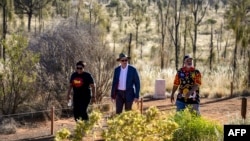Australia holds a referendum Saturday on recognizing First Nations people in the constitution.
The proposal would set up a powerful advisory body called the Indigenous Voice to help the federal parliament shape laws and policies.
Critics of the move insist it would be divisive and have little to do with addressing disadvantage in Aboriginal communities.
Australia’s constitution does not recognize its original inhabitants.
Supporters of reform want to change the nation’s founding document to set up the Aboriginal and Torres Strait Islander Voice.
It would be a committee of First Nations Australians that would advise federal parliament to help shape the laws and policies that affect disadvantaged communities.
Indigenous people comprise just over 3% of the Australian population, but they suffer disproportionately high rates of ill-health, poverty, unemployment and imprisonment despite decades of policies costing many billions of dollars.
On average, First Nations Australians live eight years less than other groups.
Some campaigners believe previous policies have been based on paternalism rather than partnership.
Prime Minister Anthony Albanese says the Voice would make a positive and practical difference to the lives of Australia’s original inhabitants.
However, the ‘Yes’ campaign that Albanese has championed is behind in the opinion polls. But the prime minister told local media that he was confident of victory.
“It is certainly winnable. This is the right thing to do. This is consistent with the Australian principle of a fair go,” he said.
Not all agree, with some saying the measure would divide, rather than unite, Australians.
The ‘No’ campaign is comprised of a broad range of dissenters.
It includes some Indigenous groups that want the Voice to have real, not symbolic, authority and to have the power of veto over government decisions that the current Voice proposal does not contain.
Other critics insist the proposal could create delays and dysfunction within government while criticizing the absence of specific details about the size, role and function of the advisory panel.
Some opponents say that by enshrining a permanent Aboriginal presence in the heart of government, there’s a presumption Indigenous people will always be disadvantaged and need special treatment.
Barnaby Joyce is an opposition lawmaker for the conservative National party, and a former deputy prime minister. He told the Australian Broadcasting Corp. that the Voice referendum has unnecessarily split the country.
“It is a debacle. It is a divisive debacle, and it has resulted in confusion, animosity and, basically, overwhelmingly people thinking that they have got serious concerns about it,” Joyce said.
Voting in Australia is compulsory. About 17 million people are registered to vote.
Only 8 out of 44 referendums have passed since 1901. The last referendum was held in November 1999, when Australians rejected the plan to severe their constitutional ties to the British monarchy and become a republic.




